Key Highlights
Understanding AI Facebook Post Generators: AI tools that generate engaging content specifically tailored to users’ social media audiences.
Market Scope and Size: The AI content creation market, including AI Facebook Post Generators, is projected to grow significantly, reaching a valuation of USD 175.3 billion by 2033.
Major Players and Competitors: Mention, ContentStudio, SocialPilot, SocialBee, Hootsuite, AIKTP, LogicBalls, and Replug.
Development Considerations: Developers must consider market factors, technical choices such as LLM API and user interface design.
Introduction
For developers navigating the rapidly expanding landscape of AI in social media, understanding the intricacies of AI Facebook Post Generators is essential. This blog offers a comprehensive analysis of the market dynamics, key players, and critical development considerations that shape these tools.
We will delve into how these generators function, the technology powering them, and the business implications of deploying AI in social media content creation. Additionally, we will explore the competitive environment, identifying opportunities for innovation and areas requiring vigilance regarding ethics and compliance. This information aims to equip developers with the knowledge to build more effective, responsive, and ethical AI-powered tools for an ever-evolving digital marketing arena.
What Is An AI Facebook Post Generator?
An AI Facebook post generator leverages AI to help users generate high-performing posts tailored to their audience’s interests.
How Big Is the Market of AI Facebook Post Generator?
The market of AI Facebook post generator belongs to the bigger market of generative AI in content creation market. According to Yahoo Finance, the generative AI in the content creation market is experiencing rapid expansion, with projections indicating a substantial increase in value to USD 175.3 billion by 2033.

This growth is fueled by the widespread adoption of AI technologies across various industries, including digital marketing, entertainment, and publishing. The North American region is expected to play a pivotal role in this market surge, accounting for 38% of the growth. This reflects the region’s robust technological infrastructure, high investment in AI research and development, and the presence of leading AI companies. The market’s growth is also attributed to the increasing demand for personalized content, the need for efficient content production processes, and the enhancement of user engagement through AI-generated content.
How Does An AI Facebook Post Generator Work?
Here’s an overview of how such an AI Facebook post generator might work:
Understanding the Objective
Content Personalization: The AI should generate posts tailored to the user’s style, brand, or target audience.
Engagement Optimization: Posts should be designed to maximize likes, shares, comments, or other forms of engagement.
Ease of Use: The tool should be user-friendly, allowing users to generate posts with minimal input.
Natural Language Processing (NLP)
Text Generation: The core technology for generating human-like text. Models like GPT (Generative Pretrained Transformer) are commonly used for this purpose. These models can generate text based on a prompt or a set of instructions.
Context Understanding: The model should understand the context in which the post will be used, such as the subject matter, tone, and desired emotional impact.
User Input Mechanism
Prompts: Users provide a topic, keywords, or specific details they want to include in the post.
Tone and Style Preferences: Users can select the tone (e.g., casual, formal, humorous) and style (e.g., promotional, informative) of the post.
Target Audience: Users might specify the target audience, helping the AI tailor the language and content to that demographic.
Data Sources and Training
Training Data: The AI model should be trained on a diverse set of data, including various styles of Facebook posts, marketing copy, and other relevant content.
Continuous Learning: The model can improve over time by learning from user feedback and new data sources.
Content Optimization
Engagement Prediction: Use machine learning to predict the likely engagement (likes, comments, shares) a post might receive based on historical data.
A/B Testing: The tool could offer different versions of a post and suggest the one that’s likely to perform best.
SEO and Hashtag Suggestions: Optimize posts with relevant keywords, hashtags, and SEO best practices to improve visibility.
Who Are Using AI Facebook Post Generator and For What?
Here are some insights into who is using AI Facebook post generators and for what purposes:
Businesses and Marketers
Many companies utilize AI Facebook post generators to streamline their social media marketing efforts. These tools help create engaging content quickly, allowing marketers to maintain a consistent online presence without dedicating extensive time to content creation. They often focus on generating promotional posts, announcements, and engaging questions to drive interaction with their audience.
Content Creators and Influencers
Individuals who manage personal brands or influencer accounts leverage these generators to produce creative and engaging posts efficiently. This helps them stay relevant and maintain engagement with their followers while allowing for quick adaptations to trending topics.
Social Media Managers
Professionals in charge of managing multiple social media accounts often use these tools to save time and ensure a steady flow of content. They can generate tailored posts for different audiences across various platforms, enhancing their overall social media strategy.
Small Businesses and Startups
Smaller enterprises, which may lack dedicated marketing teams, use AI post generators to create professional-looking posts without needing extensive marketing expertise.
What Are the Benefits of Using AI Facebook Post Generators?
Increased Efficiency
AI post generators significantly reduce the time required to create content. They can quickly produce multiple posts, allowing marketers and businesses to focus on other critical tasks while maintaining a consistent posting schedule.
Consistency and Branding
These tools help maintain a consistent tone and style across posts, which is essential for brand identity. By generating posts that align with brand guidelines, businesses can ensure that their messaging remains coherent and recognizable.
Idea Generation
AI generators can provide creative ideas and suggestions for posts, helping users overcome writer’s block. This feature is particularly beneficial for content creators and marketers looking to keep their content fresh and engaging.
Personalization
Many AI generators allow for customization based on audience preferences and engagement data. This personalization can lead to more targeted and effective posts, improving overall engagement rates.
Performance Optimization
Some AI tools analyze past post performance to refine future content. By leveraging data on reach, engagement, and click-through rates, these generators can help create posts that are more likely to resonate with the audience.
What Are Best AI Facebook Post Generators?
Mention
Mention’s Facebook Post Generator is a free AI-powered tool that helps users create engaging and original content for their Facebook page without any post generation limits. Mention also offers other free social media tools, including Threads, TikTok, Instagram, LinkedIn and Twitter.
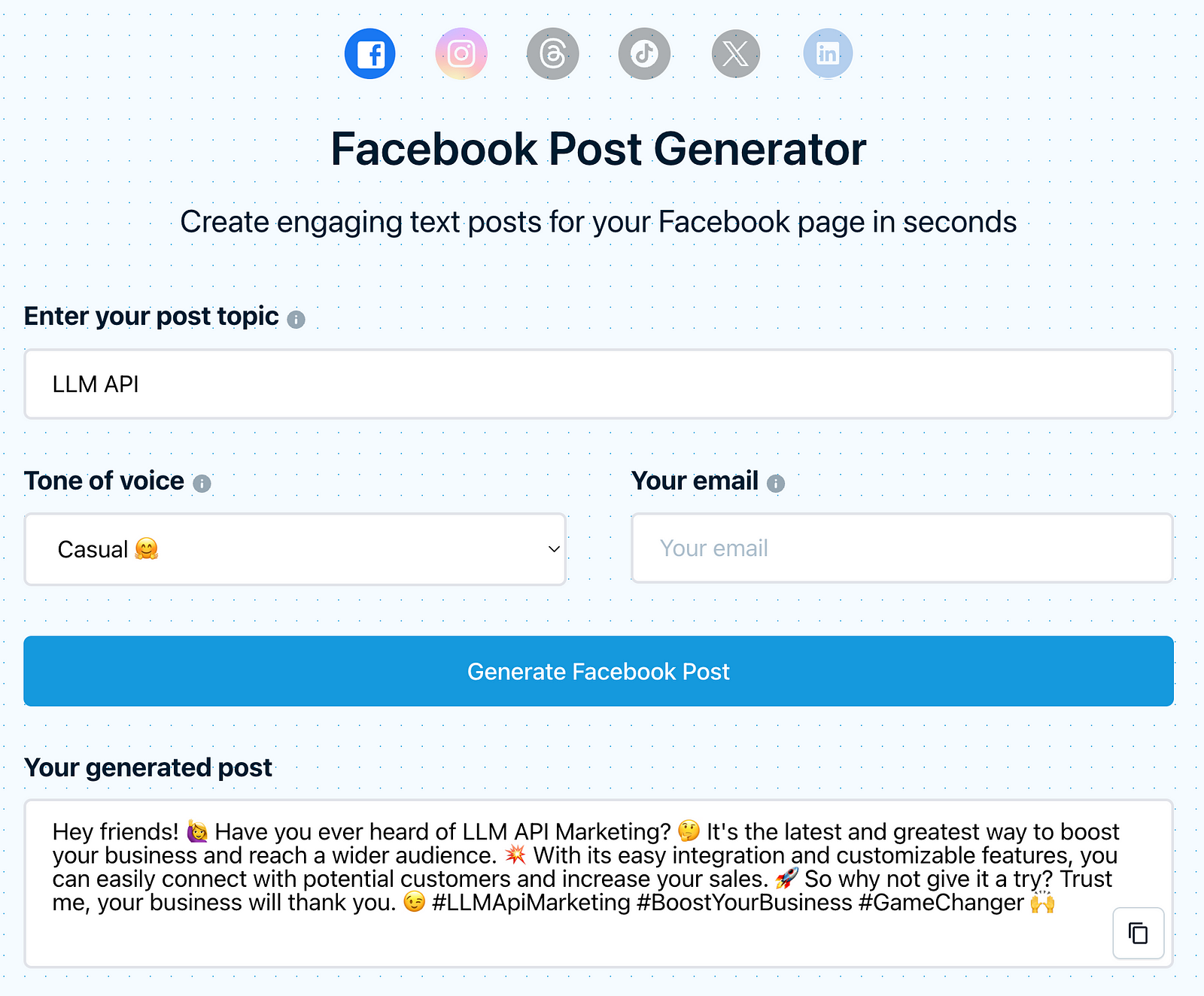
Content Studio
ContentStudio offers a free Facebook Post Generator that leverages AI to craft captions tailored to the user’s requirements, including desired word count, tone, and inclusion of hashtags or emojis.
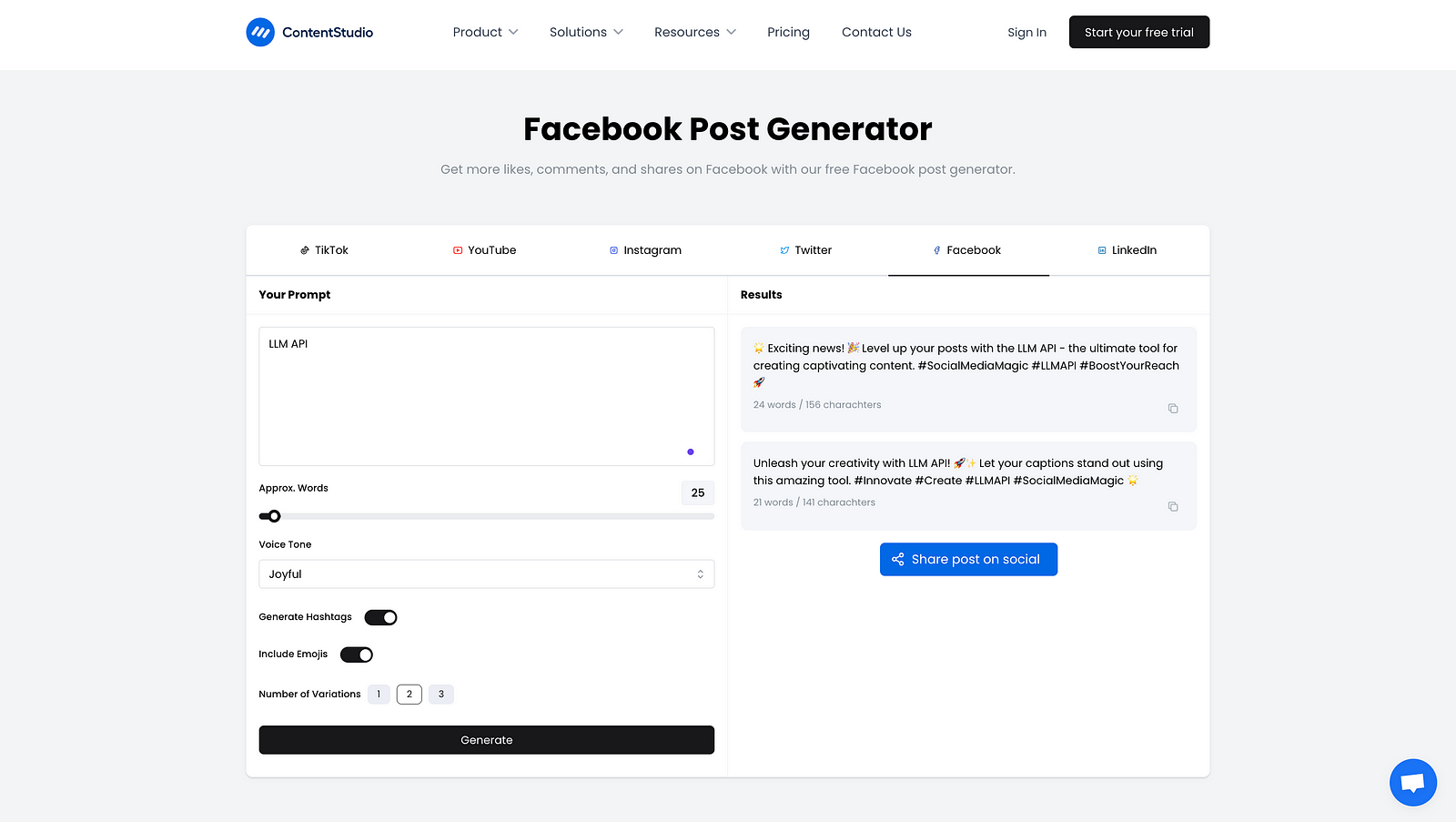
Paid plans are as follows:
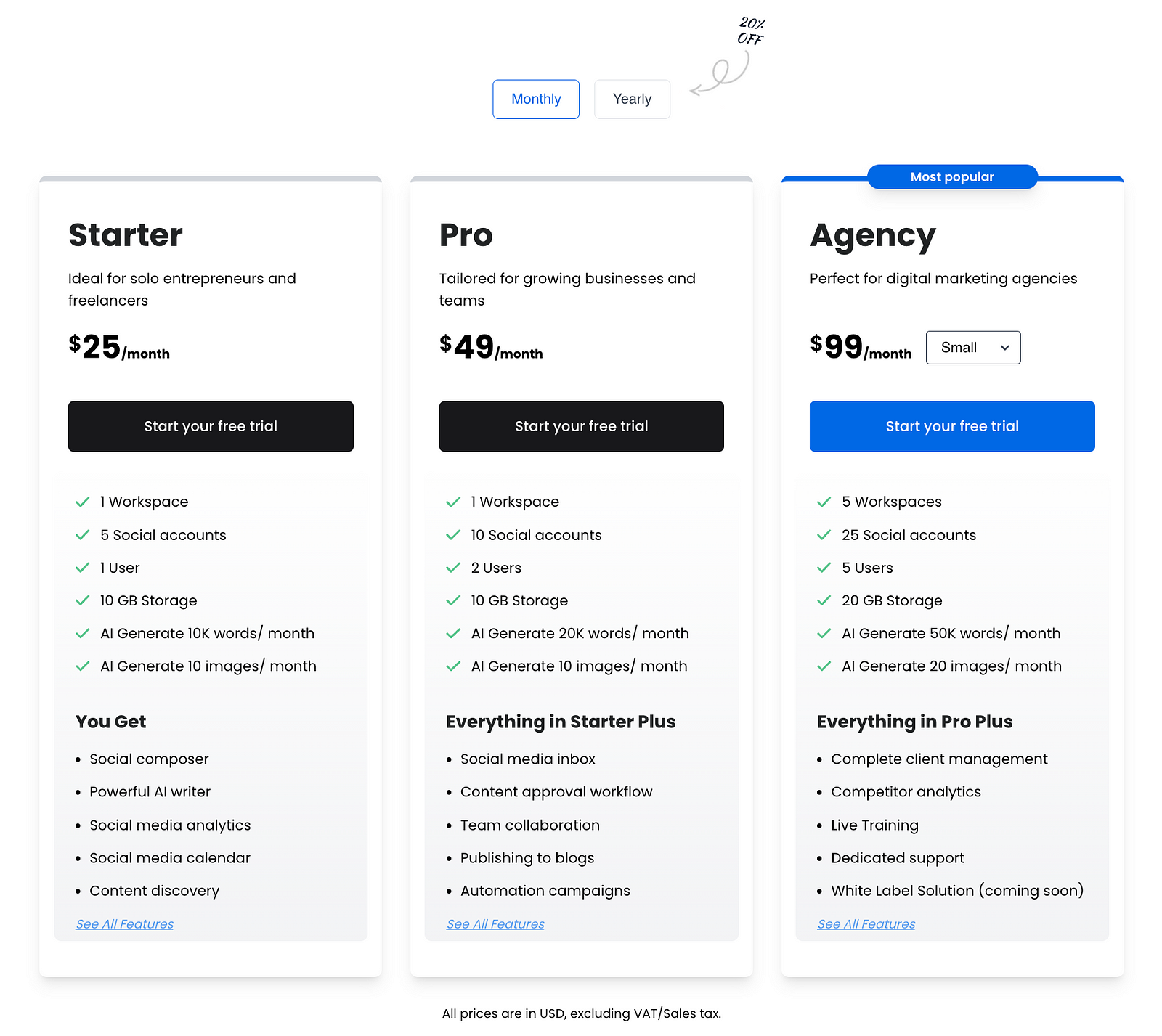
SocialPilot
SocialPilot’s AI Facebook Post Generator leverages GPT-Turbo to effortlessly create engaging, optimized Facebook content tailored to user specifications.
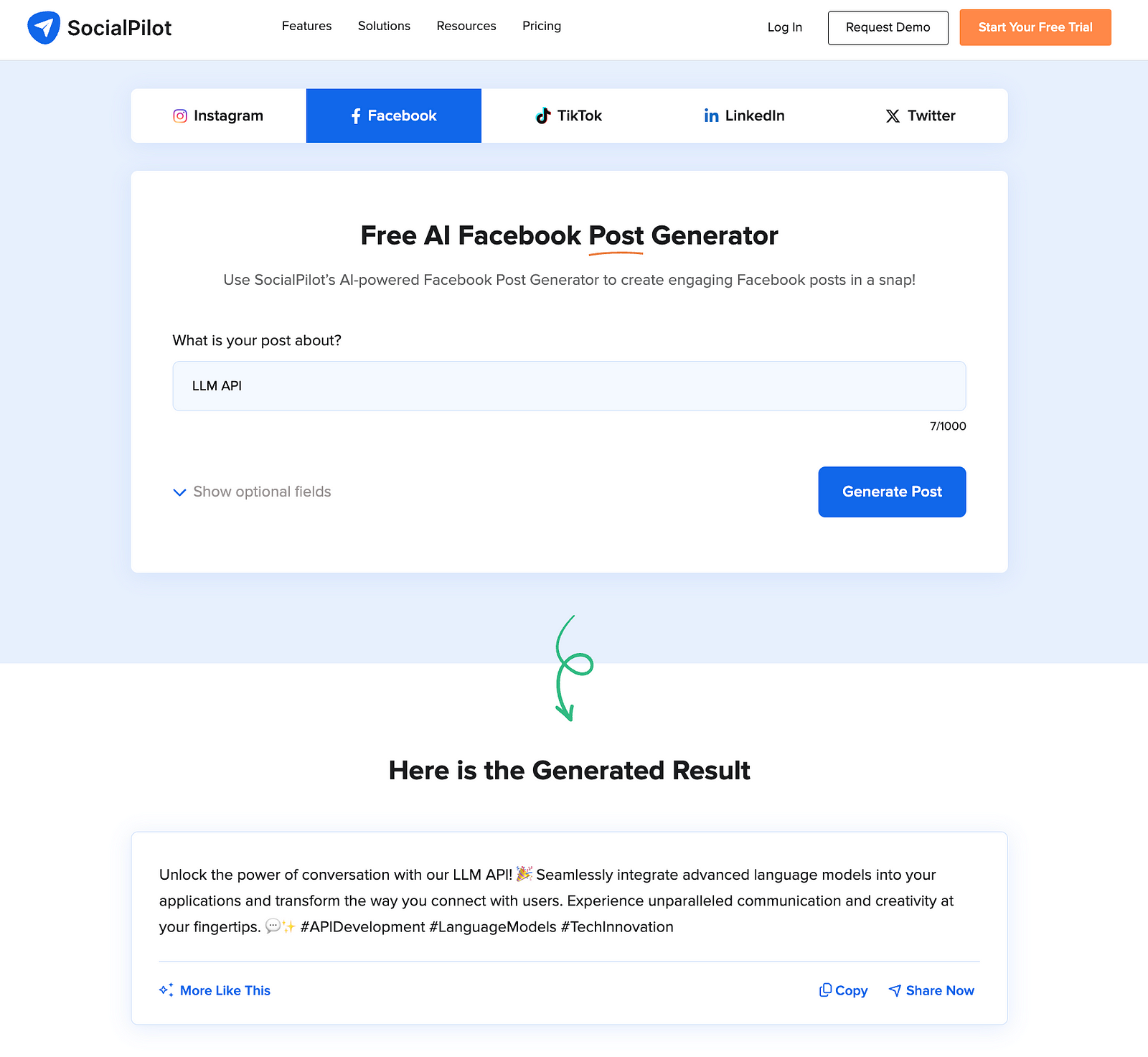
Paid plans are as follows:

SocialBee
SocialBee offers an AI-powered social media post generator that assists users in creating, customizing, and scheduling content across various platforms with ease.
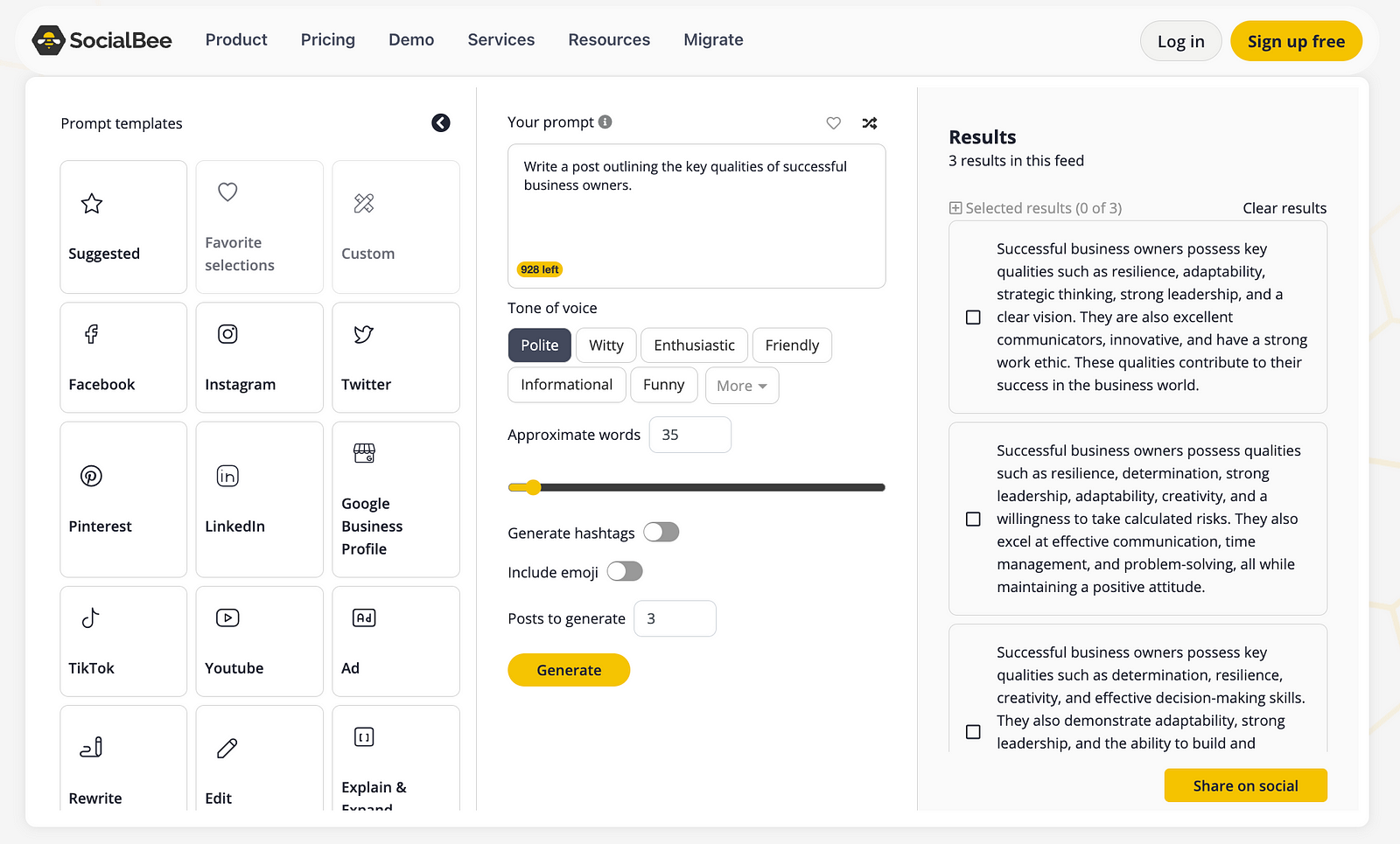
Paid plans are as follows:
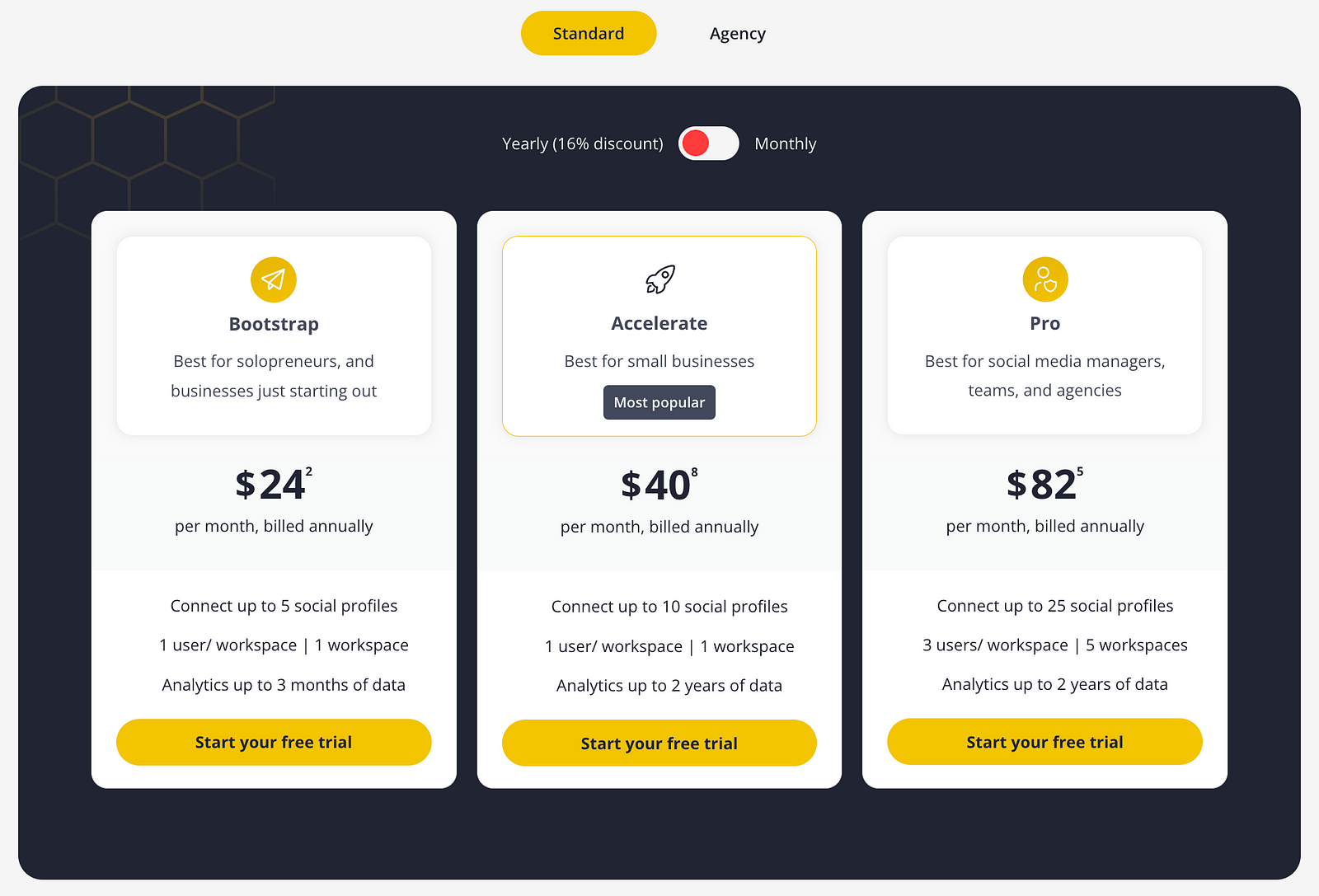
Hootsuite
Hootsuite offers a free AI-powered Facebook post caption generator designed to help marketers quickly create engaging content for social media in English, Spanish, Italian, French, and German with consistent tones.
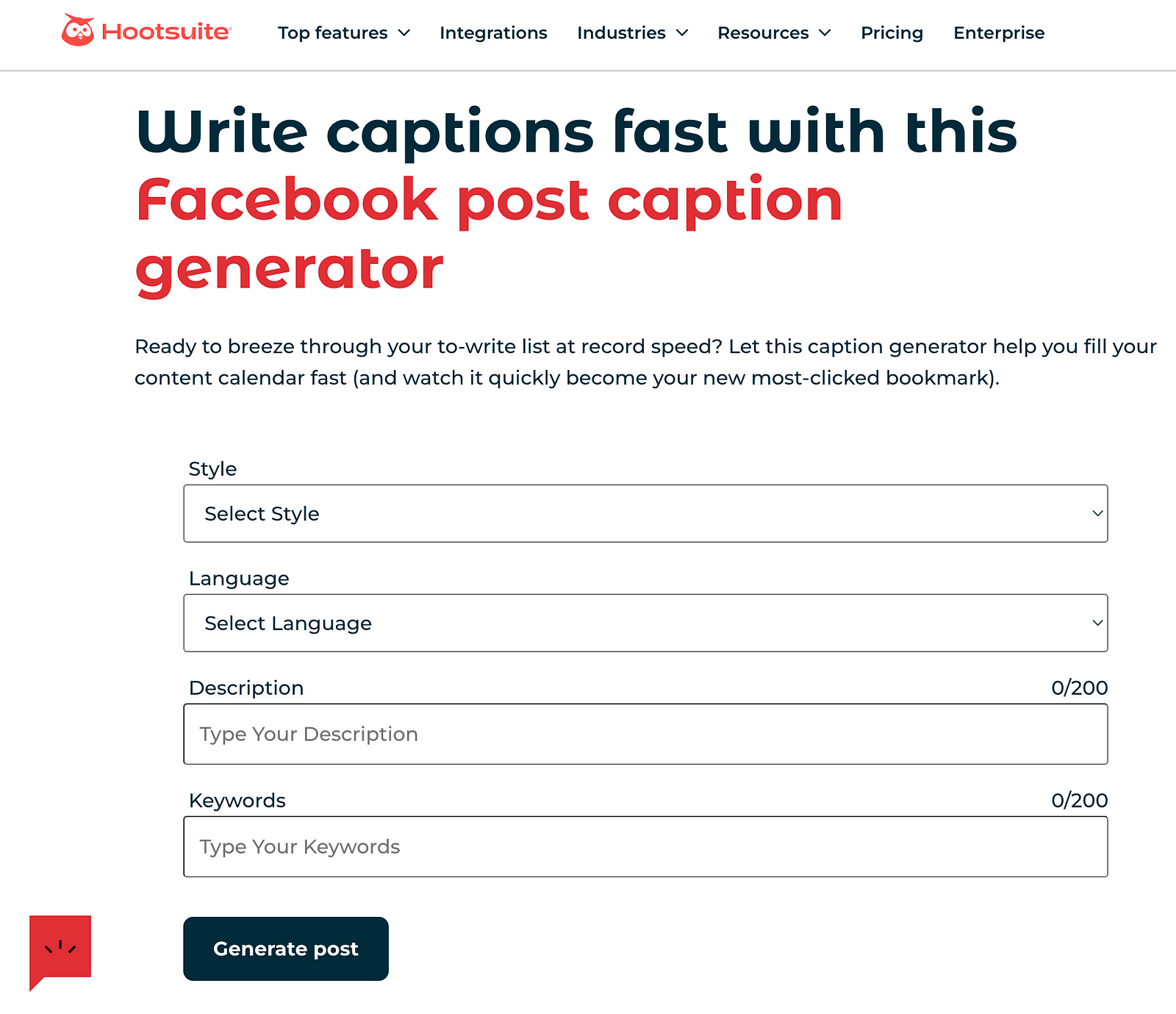
Paid plans are as follows:
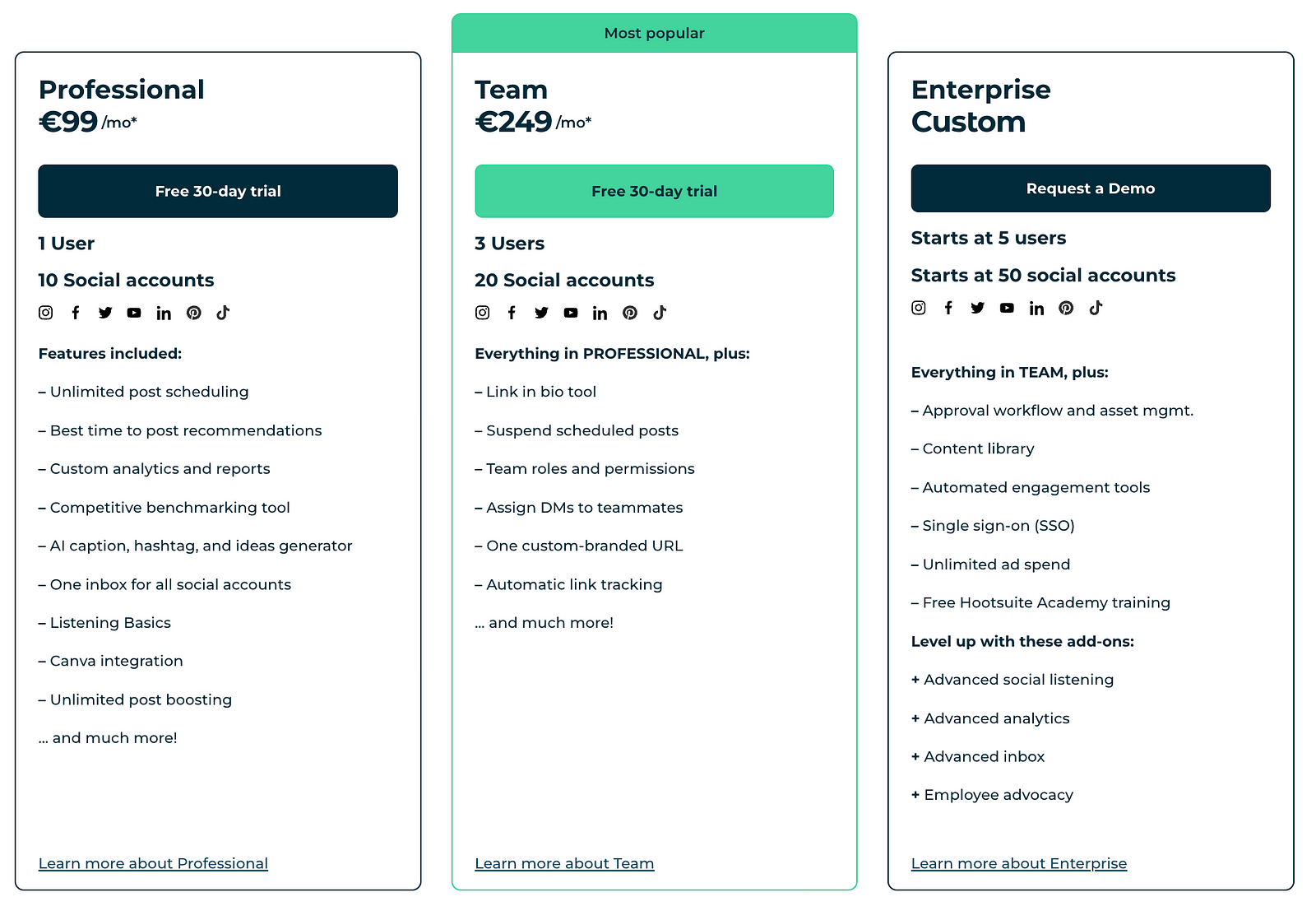
AIKTP
The AIKTP Facebook Post Generator free tool can handle a range of content inputs, from sentences to lengthy articles, and provides options for language selection, emoji usage, and different writing styles such as funny, friendly, creative, casual, or professional.
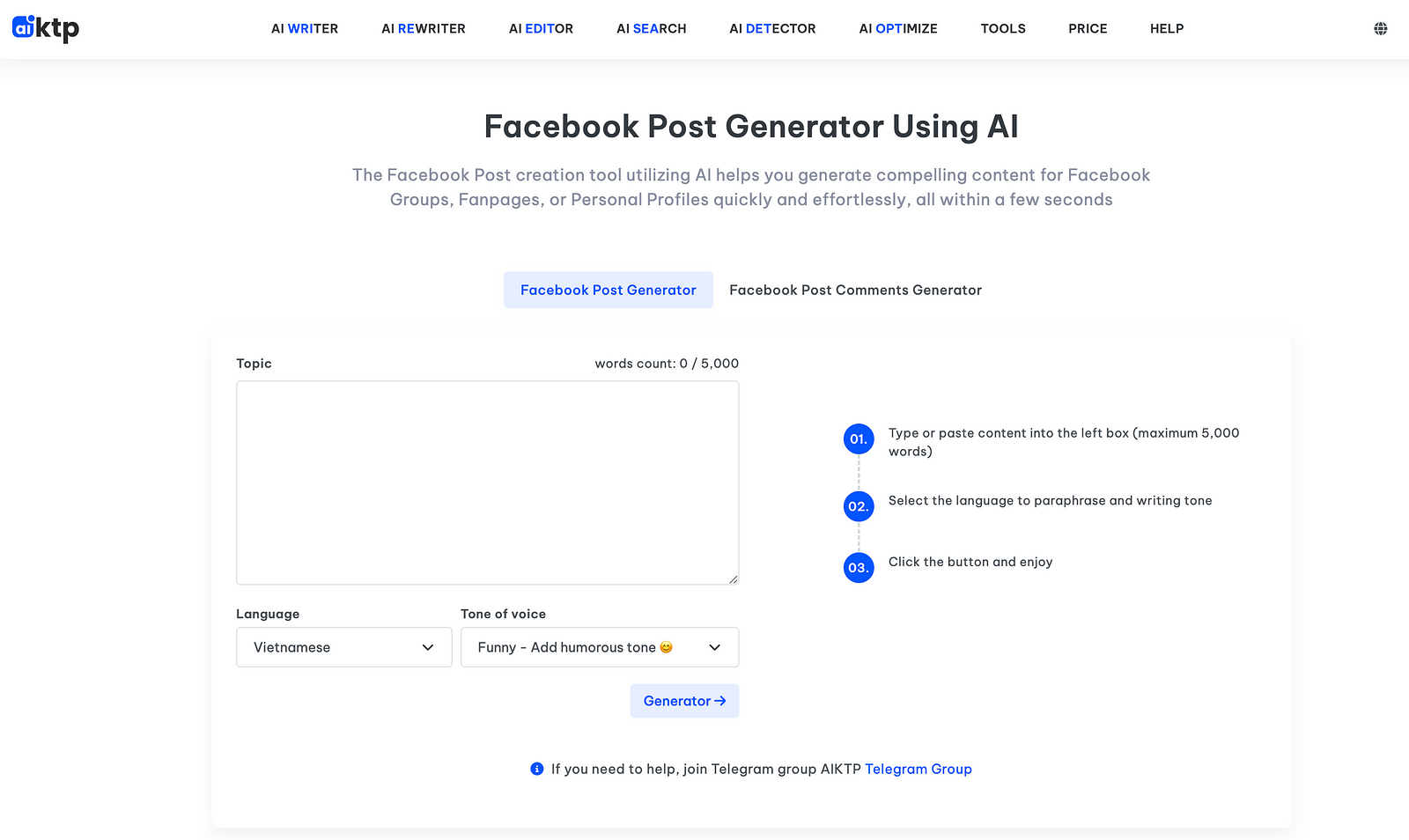
Paid plans with other services are as follows:

LogicBalls
LogicBalls offers a no-cost, user-friendly Facebook Post Generator which simplifies the process into four steps: inputting a topic, selecting a desired tone from over 20 options, choosing a word limit, and generating the post. The generator caters to both individual and business users.
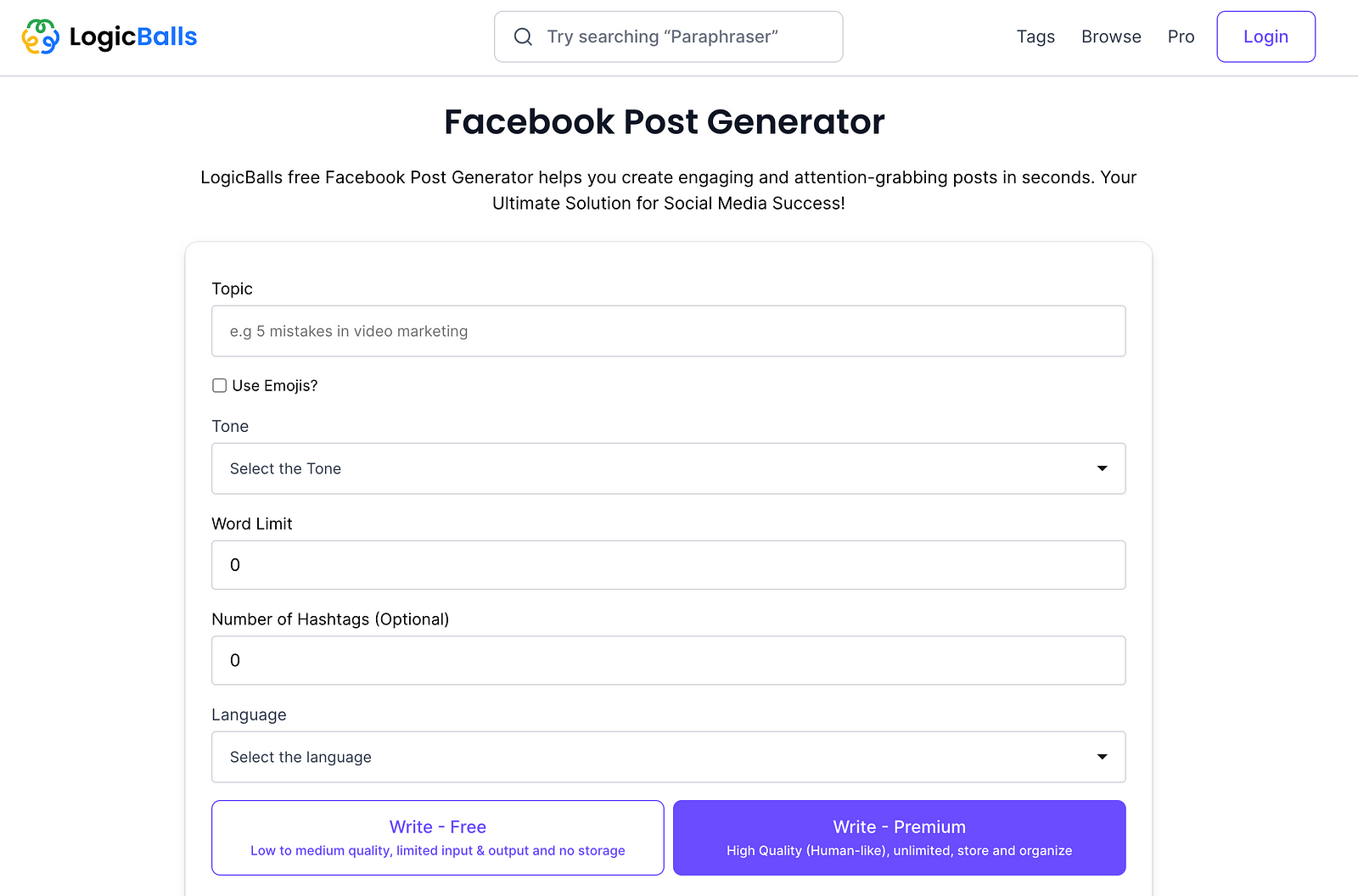
Replug
Replug offers a suite of free AI marketing tools, including an AI Facebook Post Generator, designed to create engaging social media content with customizable features such as tone, word count, hashtags, and emojis.
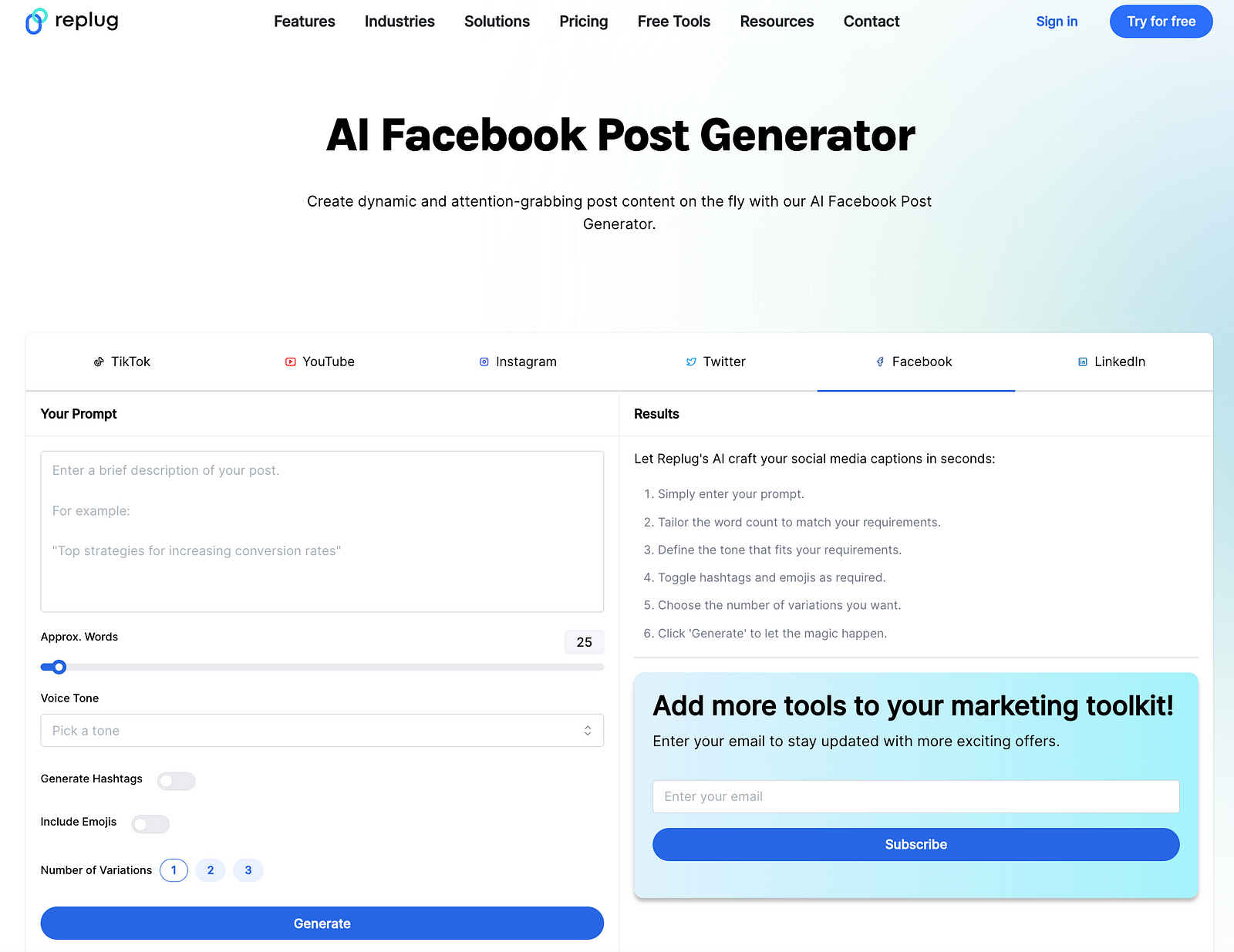
Paid plans are as follows:

What Are the Market Concerns When Developing an AI Facebook Post Generator?
User Needs and Demographics
Understand the specific needs of your target users. Are they businesses looking to automate social media engagement, or individuals wanting to create more engaging content? Knowing your audience helps tailor the functionalities of the AI.
Competitive Analysis
Analyze existing solutions to identify what they offer and what gaps you can fill. Look at competitors like Hootsuite, Buffer, and proprietary tools within social media platforms.
Monetization Strategy
Decide how you’ll generate revenue. Possibilities include subscription models, pay-per-use, freemium models, or advertising. Each has implications for how you design and market the product.
Regulatory and Compliance Issues
Social media content creation is subject to various legal constraints, including copyright laws, data protection regulations (like GDPR), and platform-specific rules. Understanding these is crucial to ensure your tool complies.
What Are the Technical Concerns When Developing an AI Facebook Post Generator?
Choice of AI Model
Leveraging a Large Language Model (LLM) API is a significant technical consideration. When considering the integration of LLM API for your development needs, a critical factor is selecting a model that not only meets technical requirements but also aligns with your budget — especially important for AI startups where resource optimization is key.
Novita AI LLM API product stands out in this regard, offering a very cost-effective solution without compromising on quality and performance. Novita AI provides access to multiple cutting-edge LLMs, including Meta’s Llama 3 and Llama 3.1 series, Microsoft’s WizardLM-2, and Google’s Gemma 2, among others. Explore a Free Trial on Our Playground.
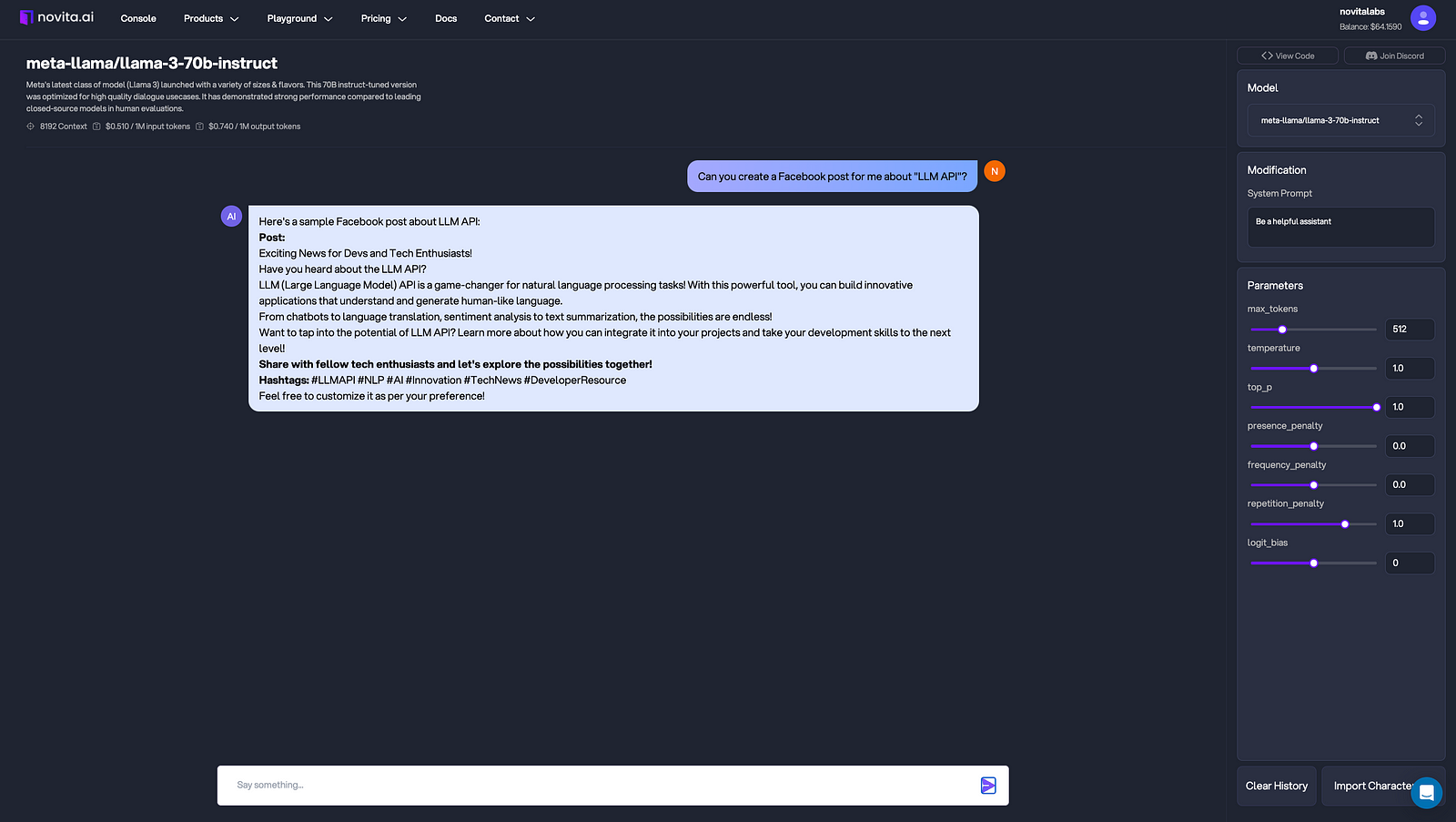
Natural Language Understanding and Generation
Your AI needs to not only generate text but also understand nuances like sarcasm, humor, and cultural contexts to ensure posts are appropriate and engaging.
Integration with Social Media APIs (Optional)
You’ll need to integrate with Facebook’s API to allow the AI to post directly or schedule posts. This requires handling authentication, permissions, and understanding rate limits.
Content Customization and Personalization
The tool should offer customization options for users to align the posts with their specific tone, style, and branding needs. This might include templates, style guides, or interactive editing features.
Safety and Content Moderation
Implement mechanisms to avoid generating harmful, misleading, or inappropriate content. This includes filters for sensitive topics, compliance checks, and user feedback systems to continuously improve content quality.
Scalability and Performance
The system should be capable of handling varying loads with minimal latency. Consider cloud-based solutions for scalability and reliability.
Additional Tips For AI Facebook Post Generator Development
User Experience (UX) Design
A straightforward, intuitive interface is crucial. The easier it is for users to specify their needs and modify outputs, the better the adoption rate
Testing and Quality Assurance
Rigorous testing, including A/B testing, to gauge user responses to different features and iterative refinement based on real-world usage.
Marketing and Outreach
Once developed, effective marketing strategies will be crucial to ensure visibility. Consider partnerships, influencer endorsements, and targeted ads.
Feedback and Iteration
Incorporate user feedback mechanisms to understand how well the tool meets needs and where it can improve.
Ethical Considerations
Be mindful of ethical issues like bias in AI outputs, potential misuse of the tool, and ensuring that the AI does not inadvertently promote harmful content.
What Are the Future Trends of AI Facebook Post Generator?
Integration of Data Analytics
Integrating data analytics into content generators will enable businesses to better understand the impact of their posts. AI tools will provide insights into post performance, helping marketers adjust their strategy based on the results. This includes analyzing optimal posting times and the types of content that generate the most engagement.
Evolution of Content Formats
With the rise of visual and interactive content formats, Facebook post generators will also adapt. Users expect more engaging content, such as short videos and AI-generated images. AI tools will be capable of creating these formats seamlessly, increasing the diversity of posts.
Ethics and Transparency
As AI usage becomes more widespread, issues of ethics and transparency will become increasingly important. Platforms like Facebook are beginning to implement measures to label AI-generated content, which could influence how these tools are used in the future. Users will become more aware of the origin of the content they consume, which could impact their engagement.
Conclusion
In summary, AI Facebook Post Generators are reshaping the landscape of social media content creation, offering developers unique opportunities to innovate while addressing market demands and ethical considerations. As this technology evolves, staying abreast of development trends and user feedback is crucial for those aiming to optimize and refine these tools. By focusing on enhancing functionality and ensuring ethical compliance, developers can significantly impact the effectiveness of digital marketing strategies and lead the way in the advancement of generative AI applications in social media.
FAQs
Can a bot post on Facebook?
Yes. Bots can be programmed to perform many actions, such as posting, commenting, and liking.
Are Facebook bots free?
Every chatbot platform will have different pricing plans, but most offer a free tier.
Originally published at Novita AI
Novita AI is the All-in-one cloud platform that empowers your AI ambitions. Integrated APIs, serverless, GPU Instance — the cost-effective tools you need. Eliminate infrastructure, start free, and make your AI vision a reality.
